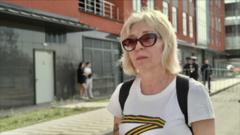As Russia commemorates Victory Day, celebrations in occupied Ukrainian territories reveal a stark contrast to the larger festivities occurring in Russia, highlighting the ongoing war's impact.
Muted Observances of Victory Day in Occupied Ukraine

Muted Observances of Victory Day in Occupied Ukraine
Celebrations held in Russian-held regions reflect attempts to demonstrate control amid the ongoing conflict.
In the eastern Ukrainian town of Bakhmut, which is now under Russian occupation, the atmosphere for the 80th anniversary of Victory Day—celebrated on May 9—has turned somber. Known for marking the defeat of Nazi Germany during World War II, this year's events are largely overshadowed by destruction and emptiness, with almost the entire population having fled.
Russian soldiers stationed in Bakhmut exhibited enthusiasm for the occasion, sharing videos on social media stating, "Happy Victory Day," and displaying slogans celebrating their military-themed propaganda. Colorful posters celebrating the "Immortal Regiment"—an initiative honoring WWII veterans—could still be seen, despite the town resembling a deserted wasteland, reduced to ruins after prolonged fighting.
In a statement to Tass, a senior officer from the Russian military affirmed the significance of Victory Day for their troops, prompting the distribution of celebratory decorations in this "liberated" city, which they view as part of a reestablished Russia. Conversely, celebrations across other Russian-occupied areas in Ukraine are smaller and less elaborate.
While President Vladimir Putin plans grand festivities in Moscow with military parades featuring international leaders, the reality in occupied Ukraine includes a few modest events, such as small concerts and piecemeal parades amidst the ruins. Denis Pushilin, appointed by Moscow, has claimed over 57,000 memorial and celebratory activities have been planned for the event across the region, signaling a stark juxtaposition to the once vibrant life that populated these territories.
Russian soldiers stationed in Bakhmut exhibited enthusiasm for the occasion, sharing videos on social media stating, "Happy Victory Day," and displaying slogans celebrating their military-themed propaganda. Colorful posters celebrating the "Immortal Regiment"—an initiative honoring WWII veterans—could still be seen, despite the town resembling a deserted wasteland, reduced to ruins after prolonged fighting.
In a statement to Tass, a senior officer from the Russian military affirmed the significance of Victory Day for their troops, prompting the distribution of celebratory decorations in this "liberated" city, which they view as part of a reestablished Russia. Conversely, celebrations across other Russian-occupied areas in Ukraine are smaller and less elaborate.
While President Vladimir Putin plans grand festivities in Moscow with military parades featuring international leaders, the reality in occupied Ukraine includes a few modest events, such as small concerts and piecemeal parades amidst the ruins. Denis Pushilin, appointed by Moscow, has claimed over 57,000 memorial and celebratory activities have been planned for the event across the region, signaling a stark juxtaposition to the once vibrant life that populated these territories.

















